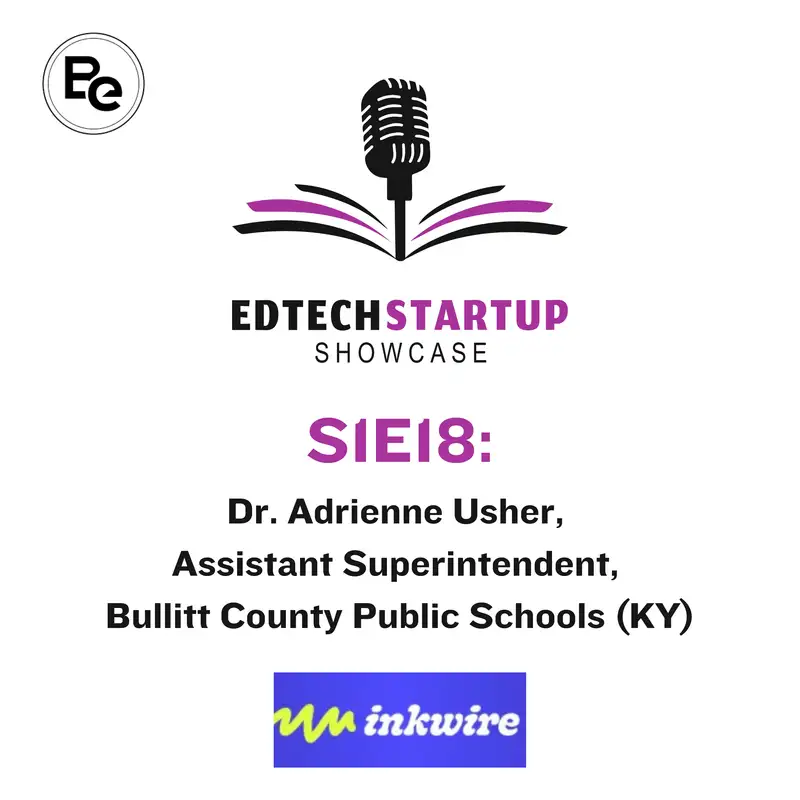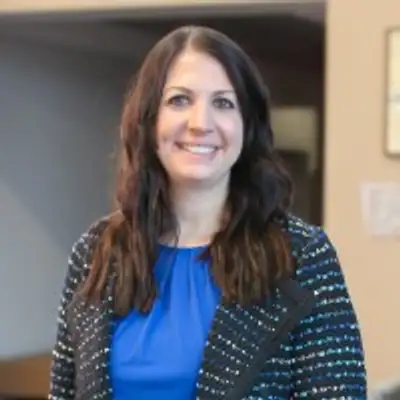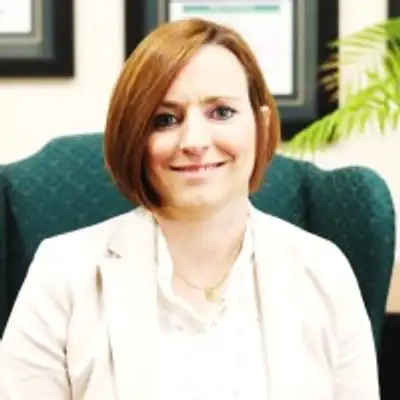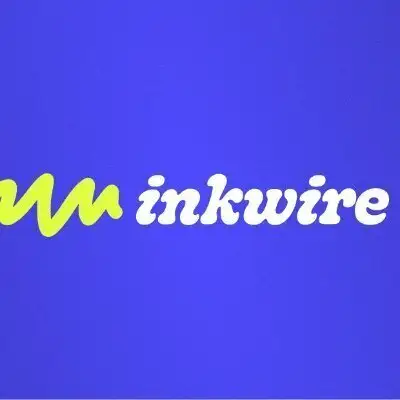Creating authentic learning experiences with Dr. Adrienne Usher
[00:00:00] So welcome to the podcast today, Adrienne. Thank you so much. I'm excited to be here. We're excited to have you. I know talk a little bit about your role and what you do in your school district.
So, I am assistant superintendent in Bullitt County Public Schools. We are located just right outside of Louisville, Kentucky.
Shepherdsville, Kentucky is where we're at. And my role as assistant superintendent is. It's, it's definitely different from day to day. And really, I work a lot with our federal programming, our instruction curriculum team you know, kind of all things, curriculum, instruction, and assessment I work with, but of course, I mean, I have some other responsibilities related to human resources, technology, and, and other aspects within the district too.
Well, I know that you're [00:01:00] doing some pretty great stuff in your district related to project based learning. Can you talk to us a little bit about what that looks like and how you're rolling that out with staff?
Yeah, so we really have been on the journey of what I would say is really trying to change what the school experience is for kids.
And not really just for students. It's really for our teachers and for our community as well. And We first, before getting into project based learning and talking about that and teaching our teachers about it, we really started with we have a graduate profile and we have competencies that competencies, dispositions, some people might call them, that we are working on embedding into the academic experience with our students as well, you know, effective communicator.
Productive Productive Collaborator and Innovative Problem Solver. And [00:02:00] so starting that journey of developing those competencies really took us down the path of rethinking what school is, the student experience, and what really happens in the classroom. And so we. We call, we refer to it as authentic learning experiences, experiences that are content standards based.
They also include a competency from our graduate profile. And then also connecting, bringing in a greater purpose for what that learning is, something in the community. It could be. You know, local to the school, it could be local to our community, or it could be global, you know, whatever that might be. And so, project based learning, honestly, is 1 way you can create an authentic learning experience in our, for students in the classroom.
That is one of the strategies we've [00:03:00] trained our teachers on. We worked with PBL works for about two to three years and trained hundreds of teachers on that structure and what that looks like. We also we talked to our teachers about simple shifts, little, simple things they can do with existing learning that they have planned for students to sort of start hitting that way.
Because we know it's hard. To think about a traditional classroom, and then you immediately go to project based learning. That's really not possible. You got to have time to develop the understanding, the structure, and what that experience needs to be for students. And the assessment piece inside of that is, is, is another beast within itself.
I love that you call them simple shifts. That's such a great way. And it's so manageable, right? Because sometimes we have these big initiatives and we want people to implement them, but if they just do simple shifts, you're going to get there much easier.
Yeah, you know, I constantly refer to change and anytime you're trying to [00:04:00] change something you're doing to learning to ride a bike.
Most, most children. Or adults who are learning to ride a bike. They don't go from on Monday, not knowing how to, to the next day, you know, they're on a two wheeler, just going down the road. I mean, that's just not possible. So it's the same thing in life on anything. You know, when you learn to drive, you, you start off with this and you go there.
So we have to do those same, we have to help our teachers start with simple changes they can make to start working towards. What that ultimate vision is, but you also have to show them what that vision is. And 1 of the ways we've been able to implement with our teachers changing what that student experience looks like is we use a cohort model of professional learning.
So, all the professional learning, our goal is to always provide. If [00:05:00] we're really going to be about changing the pedagogy that's happening in the classroom and changing what that experience is for teachers and students, we really, and based on just experience, what we've done with cohort models is. When teachers work together collaboratively over a long period of time it helps them, it gives them time to not only understand, but do a simple change and then keep growing from there, if that makes sense.
Yeah, I love that idea of a cohort.
Yeah, so pretty much we, so we started, we just actually kicked off one this week on Tuesday. We started our authentic, our authentic learning architects cohort. So, it's 2 teachers from every single school in the district. And they're coming in and working alongside each other instructional coaches as well.
And our [00:06:00] curriculum team and really starting to look at. What does authentic learning look like in the classroom? How do we start building that? What are things I'm already doing and how can I start to tweak that to get to where we eventually want to go, if that makes sense? And I think that's important too for teachers.
You do, you know, you definitely have to begin with the end in mind. I definitely believe that like teachers and even students have to see the vision, they have to see what this can look like, but also understanding that no one is expecting you to be there next week. You know, that's impossible. You just, none of us could do that.
Yeah, and I, I love, I, I think it's great that you talk about sharing that vision with them because I don't think we do that enough in education and I'm guilty of this as a, you know, when I was a [00:07:00] principal of not sharing that because, and I think teachers don't always see that big picture because they're in their classroom teaching day to day and they're focused on that and so bringing them into that vision of what this looks like long term really does bring in that buy in too.
And it's been a long journey. I mean, You know, we started the work on our competencies. Oh, goodness. I mean, two to three years before COVID. So this is ill and and change takes time. Nothing's going to happen, you know, when I hear, you know, sometimes in education, you hear people talk about it takes 3 to 5 years.
I would argue it takes 10 or more years,
you're
really going to do it. Right. And you're going to, you're going to do it in a way that it lasts no matter who's there. Who's, you know, who's coming and going out of the organization because it's got to become really. [00:08:00] your DNA, the way you work, the way you think, the way you decide, you make decisions.
I mean, everything about it. So it takes time.
And I love that you talk about it being the school experience. You know, what do we want the school experience to be? Because That's such a great way to look at it. So when you're talking about the school experience with project based learning, what does that look like?
I know you use Inquire and that's been part of it. Can you explain that a little bit?
Yeah, so we we started a partnership with Inquire several years ago, just starting to kind of build it out think about how could we give teachers Inquire really is a great platform for teachers and students to work in, and In that platform, it really allows teachers to set up a classroom structure.
You know, I compare it to a way to think about it. When you think about Google Classroom, you know, we're a [00:09:00] Google district. We, our teachers, you know, use Google Classroom, but really, for the most part, Google Classroom is a place where you give information and you put it in a folder. You might assign, you know, a Google form.
It's kind of more of a information gatherer, collector. You submit this task, exchange of information, whereas Inquire is more of a platform where you can actually create together. Students and teachers can. So, for example, you know, you want to launch your project, right? You might have a driving question depending on what model you're using.
So that driving question, you know, the teacher can put it in there. Students then can respond. You know, when they're doing their research or they're prototyping if they're doing their final product, let's say it's a pitch, whatever it might be, students can upload evidence of their work along the way, if that makes sense.
[00:10:00] Yeah, what they're researching along the way, what they're finding out, they can also give feedback to each other. It's a very the, the platform's really easy to use, you know, if you're a classroom teacher. Sure. And, you know, you're walking around the classroom, they can use any kind of device and take a snapshot of some student work and immediately upload it there, and they can tag it.
Kids can tag each other on the work. So, whether they're in school or outside of school, you know, they can still be collaborating on what that is. You know, students also have the ability to, let's say, that they're at home or they're out working on this. You know, learning experience that they want and they want to upload a photo of evidence that they did someplace else to connect to that.
They can do that in there. So it's really a way to create and really document the learning journey. That's been going on. Assessment can occur in it as well through the [00:11:00] platform. The other thing that's really nice about it is. Most recently there's a portion of it called Kaleidoscope and Kaleidoscope allows teachers, it's, it's AI backed and it allows teachers to, you know, when we think about the school experience, what we're trying to create for students and for teachers.
None of us had this, many of us, I don't want to say none, many of us have not had that school experience. You know, I always like to say that if you put a bunch of people in a room, and I ask you, tell me what, what your K to 12 journey was like, tell me what your K to 12 journey was like, no matter the age, you know, you could have all different age ranges, there would be very similar experiences to You know, probably receiving a lot of information, taking tests and so Kaleidoscope, the tool within InkWire lets [00:12:00] teachers ideate, you know what I mean?
Different ways. Maybe I want to, maybe I know what my driving question is for what this project or experience might be. And it didn't even have to be a project. It could just be, I want to think about something that I'm doing and just work with it on a larger scale with students. What is this essential question?
Okay, I have my driving question or my essential question. I know at the end of it, I want students to, I don't know, create a proposal. And share it in front of the city council. And I know that my academic standards are some literacy standards, some social studies standards. And I also want to do the competency of effective communicator.
I want my kids to, you know, maybe something specific within our competency of effective communicator. And they can put that in there and keep iterating and it will help them [00:13:00] build You know, they can put items in as they get more ideas. They can put those into the different sections. And then just with technology, especially AI, even though it's giving you ideas, we as humans still are the consumers.
Yeah.
It's producing, you know what I mean? It's just like when you go buy a car, just because the salesman tells you all the things, most people do their research, they find out what, what, what this car has, what that car has all. It's the same thing with AI, even though it's giving them ideas. They can take something, a snippet from here, add it here, you know, iterate again with AI to give it, to end up with a, you know, a pretty rigorous experience for students that's academically aligned, but also is connected to more than just inside the four walls of the classroom.
the typical traditional classroom.
Yeah, it's like that [00:14:00] collaboration piece, but it's just instead of another teacher computer.
Yes. Yes. Yeah.
Yeah. That's such a great tool to have within that that teachers can use, because like you said, if you tweak those prompts and you keep asking it different things, you're going to get some really great ideas.
Yeah.
So what do teachers, how do you help teachers adjust their mindset I know you have the cohorts, but how do you help them adjust their mindset if maybe they don't feel comfortable with technology and you have all these great tools that they can be using? How do you help them with that?
Yeah, you know, it's, it's funny when we just, when we, when you think about technology itself, it really is,
I really, when I think about tech, there's lots of tools out there. You know, there are tools for this. There are tools for that. It is easy in a classroom to be consumed with the next tech tool [00:15:00] that lets kids post here, or the next text tool that does quizzes, or the next tech tool that does whatever, you know, it might be.
And I think. When we talk about how do we have teachers change their mindset around technology, how do teachers get them to use technology or use other way, innovative ways to use technology, you know, 1st off. We've, we've obviously all as human beings embrace technology because. Most everybody that I know has a cell phone,
Mm-Hmm. . Yep. .
There's not many jobs today that there's not some sort of technology that is not involved in it. Whether it's just the basic use of technology or maybe a high level use of technology. So, you know, definitely the days of talking about. [00:16:00] The use of technology and how I'm going to use it. It's, it's here.
It's been here. We've all been using it in our daily life. So it really just kind of is the way we do things. Now, I think the bigger question when we talk about. Mindsets and technology is. And I would say this to any district leader or to any. Principle the context of how are we going to use technology?
My question is. What is your instructional vision for what you want to happen in the classroom? Then we can talk about what are the technology platforms that will support that? What are the tech tools that can be to support that? Because you really can, when there's so many choices to choose from, what we, what can happen is we do the same old thing, because there's so many to choose from, [00:17:00] or we just, or there's some teachers I've seen that go to this thing, to this thing, to this thing, and, and there's really not any consistency, if that makes sense.
So. I think the bigger question is, if you're going to talk about technology in your school building or in your district and how teachers are using it, the question I want to ask is, what's the vision of what students are going to experience? in that classroom? And where does technology play the role in that?
And where, what makes sense? Technology is an enhancement. It's not a replacement for the teacher. It never should be a replacement for the teacher. And so how do we make sure that the tools we're choosing and the, and the use of technology really supports what we want? students to experience in our classroom.
Yeah, I think that's so important because I see so [00:18:00] often teachers just find things and then they want to use them in their classrooms and they want to use them isolated where not everybody's doing the same technology. And now there's a lot of free grants. Or you know, free trials for different things, and you probably get this in your role, but I know that teachers would try them and then they would put the curriculum director's name in and it would email her and she'd be like, do not do that.
Yeah. 'cause you get all these companies. But it really is about having that instructional vision, like you said. What do we want kids to know? What do we want that environment to look like? And how can we make that happen versus just finding something and saying, Oh, this is cool. You know, we should try this.
And the other thing is too, I mean, there, there are tools that expire, you know, or, or they're not in existence anymore. I mean, Just not too long ago, you know, I was using in my own work an email tool that, you know, kind of had an AI behind it. Literally, [00:19:00] I was using it for about six months and I got an email that it was going to be non existent.
So, so, you, you know, that happens. And so you just have to think about it's what's the bigger purpose than just the tech tool what what's the bigger purpose of what this 4060 minutes you know if you're in secondary whatever your schedule if it's a 60 minute what's that 60 minute experience. Gonna feel and sound like an instruction.
What do we expect? What do we want the kids to walk away with? What do we want the students to be engaged with? And that should then, what's the content? What's the standards? What's your competencies? Then that should inform. what makes the most sense. And it may not even be technology for that day. It could be, I mean, it could not be technology for that day.
So
yeah. And I, I think that brings up a great point too, because kids are on technology all the time. So [00:20:00] making sure we balance that out is, is the tech tool, the right thing for that particular moment and for what you're teaching within that block. I think that brings up a great point.
All right. All right. Thank you so much, Adrian, for being here. It was great having this conversation with you. Anything else you want to share for listeners about Inquirer, your experience, you know, rolling this out or what they could expect if they wanted to do something similar?
I mean, you know, I would say as educators, we, we are all in this together.
Yeah.
You know, really just. Change overall is hard. And, and the work that we, that we're doing here, thinking about the way school has been and. It takes time, it takes patience and it, one day something works and it might work for a while and then you have to pivot, you know, here to, to get [00:21:00] back.
But I would definitely encourage listeners, you know, if they are interested in. a more authentic learning experience and having ways for staff and students to co create learning along with some AI support and assistance. Inquire is a fabulous tool for that. A fabulous platform and I'd be happy to, you know, feel free to reach out if I can help at all.
So.
All right. Can people find you on LinkedIn?
Yes, they can find me on LinkedIn. Yes.
Okay, that might be a good place that we could link in the show notes. Thanks again for being here. It was a great conversation and you guys are doing amazing things in your district. It's great to see all the, like you said, the time that you're putting into everything and having that long term vision.
So that's really exciting to hear about and just see that happening. So thanks again for joining us.
Thank [00:22:00] you.




